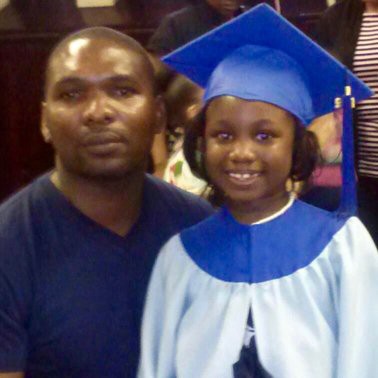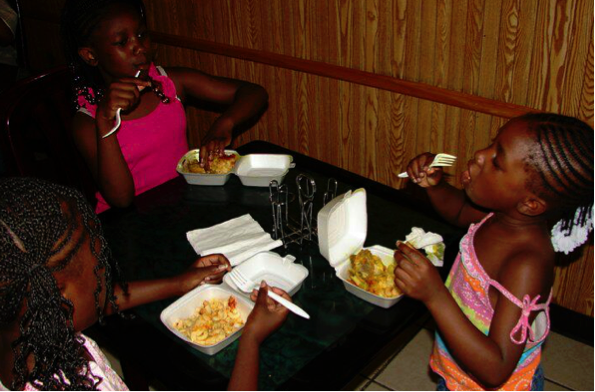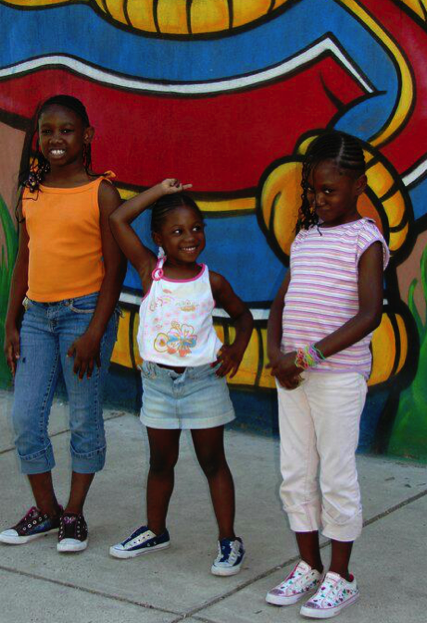How Patrick won his freedom after three years in immigration detention
Patrick is a green card holder and has lived in the U.S. for 17 years. Born in Jamaica, he has five U.S citizen children. The youngest three are seven, ten and twelve years old.
In January 2013, he was convicted of a marijuana-related offense and sentenced to nine years of probation without any jail time. It was his first and only conviction. In July of that year, during a regular check-in with his probation officer, ICE agents arrived and took him into custody. He was put in the back of a van and driven to York County Prison, about an hour and forty-minute drive outside of Philadelphia.
Patrick thought he would be released in a few days’ time as soon as his papers were sorted out.
He did not leave detention until June 2016.
Patrick first came to the U.S. in 1999 to compete in an invitational soccer tournament. A goalkeeper, he played on the Jamaican team Buff Bay United. While he was in Florida for the tournament, he met LaTonya Curry out one night.
They began to date and soon fell in love. Patrick decided to stay in the U.S. to be with LaTonya, a U.S. citizen. He and LaTonya moved to Philadelphia and he started working as a chef in Jamaican restaurants. They married on August 31, 2000 and Patrick became a lawful permanent resident. A few years later, he became the head chef at Mango Bush Restaurant in the West Oak Lane neighborhood of Philadelphia.
“Cooking is fundamental to me,” Patrick explains. He first learned to cook in Jamaica from his mother. Patrick’s father died when Patrick was fourteen, and his mother was responsible for raising him and his nine siblings. So Patrick helped cook for his family and in this process learned to make many Jamaican dishes. Curry shrimp, mango shrimp, and curry goat are his specialties. Mango Bush was often crowded and Patrick recounts how many people loved the food, “I told my customers to be the judge, not me.”

Even though Patrick and LaTonya separated in 2007, he remained very involved in his children’s life. He also continued to pay the rent for Latonya and the children’s apartment and he picked his children up from school every single day. After school, he took them to the park, to the movies, and out to dinner and helped them with their homework.
Once in immigration court, Patrick learned that he could not be released while his case was pending because the government classified his marijuana conviction as an “aggravated felony,” thus subjecting him to mandatory detention. This meant that he was ineligible to be released on bond while his case was pending. (Years later, the courts recognized that this had been an incorrectly classified as an “aggravated felony.”)
Thus even though Patrick was not sentenced to a single day in jail for his marijuana conviction, he found himself in a prison, with no way to be released except by signing deportation papers. “I never could. If it was just for me, I would have left but I feel like if I leave my girls here, I would be abandoning them. I need to stay here for them.”
Had Patrick been able to have a bond hearing, he would have been able to demonstrate that he did not pose a threat and that he had deep ties to his community. He had children who depended on him for support, he was a beloved chef and had been a lawful permanent resident who has lived in the U.S. for nearly twenty years. Patrick had every reason to want to go to court. But because of our mandatory detention laws, he never had his day in court to present these facts.
This term, the Supreme Court is hearing a case about mandatory detention. At issue is whether it is constitutional for someone like Patrick to be held for extended periods without a bond hearing. Some lower courts have held this is not. They have held that individuals detained for more than six months should be able to have their day in court. But these rulings do not apply in Pennsylvania. The case before the Supreme Court, Jennings v. Rodriguez, is an opportunity to provide nationwide access to a bond hearing to people like Patrick who are held in detention for long time periods.
During his first few months in detention, Patrick was in complete shock. “I felt sick. I didn’t know what to do,” he said. He describes the conditions in the detention facility: “Being in detention is like you are out in the sea, drowning and you don’t have anything to save you. It was the hardest thing I have experienced in my life.” Patrick was attacked by other prisoners and sent to punitive segregation. Once, he was sent to segregation for four days for having applesauce in his cell.
Without Patrick’s income, LaTonya was unable to afford her apartment and she and the children were evicted. In detention, Patrick was powerless to help his family. With no one to turn to, LaTonya and the children were forced to move to Georgia to live with Latonya’s sister. Before this, Patrick’s children had been able to visit him in detention every other week. But after the move, LaTonya and the children came to visit three times before Patrick, with a heavy heart, told them to stop coming. The trip — a thirteen-hour drive in each direction — was too expensive and emotionally exhausting.

It was very difficult for Patrick’s girls when he was incarcerated. They struggled to adjust to their new school in Georgia. Before Patrick’s detention, his daughters were honor roll students but the worry and stress about their father’s court case impacted their school performance and their grades fell.
In June 2016, one-month shy of three years after he was apprehended at his probation appointment, Patrick was finally released from detention. His children were in court that day. “It felt like winning a million bucks,” Patrick recalls. That night, the whole family went out to dinner at Red Lobster. Over their meal of shrimp and salmon, Patrick answered his daughters’ questions about his life inside the prison. They wanted to know if it was clean and if he had friends. “I try not to hide anything from them,” he explains. Patrick’s family stayed with him in Philadelphia for a week. They spent time talking and Patrick cooked for the family. They went to see a Disney movie together.

Last week, Patrick appeared in court for his regularly scheduled immigration case. He is applying for cancellation of removal, a form of relief available to green card holders like Patrick who have lived in U.S. for years and who meet certain other requirements. His next court date is in March 2017.
Patrick hopes to move to Georgia to be near his girls but will not leave Philadelphia until his immigration proceedings are complete. Once all is settled, he plans to open a Jamaican restaurant in Georgia. In the meantime, he packs boxes for twelve-hour shifts from 7 a.m.to 7 p.m. Patrick sends everything he can to his children and now that he is out, he talks to them on the phone every day. Patrick’s dream is one shared by many parents: he hopes to see his girls graduate from college. Destiny wants to be a lawyer, Uriah a neo-natal nurse and Amira a crime scene investigator. He tells his daughters: “Whatever you want to be, you can be.”

*Editor’s Note: The term “detainee” is dehumanizing, yet we deliberately use it in the title of this piece to parallel the title of the film 12 Years a Slave, as so many aspects of immigration detention are inextricably linked with historical and present systems of slavery and incarceration.

